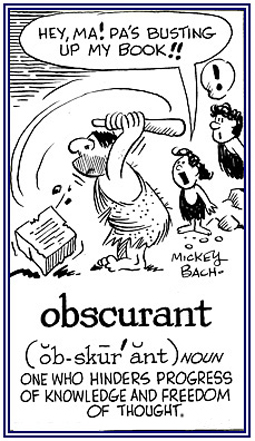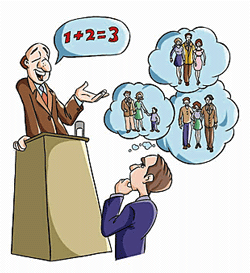obscur-
(Latin: dark, dusky; indistinct, uncertain; unintelligible; vague; ambiguous)
From Ars Poetica, by Quintus Horatius Flaccus (Horace) who was instructing writers that it may be difficult to achieve brevity without sacrificing clarity.
Not that the story need be long, but it will take a long while to make it short."

Go to this Word A Day Revisited Index
so you can see more Mickey Bach illustrations.
2. Lacking in light or illumination; dark; dim; murky: Sammy and Jennifer entered the house in the obscurant darkness which was surrounding them.
James saw an obscurant bank of clouds in the sky.
When the thunder storm hit in the area, Mike was suddenly in a very obscurant room because the electrical power was affected by the lightning.
3. Little known, unheard of, or nameless: Sam and his family stopped to get gas for the car at the most obscurant town on their trip. There were only a handful of houses and a gas station!2. The practice of withholding information from the people: The national government was accused of secrecy and political obscurantism regarding what happened during the military rescue of the person who was abducted by the terrorists.
3. A style in art and literature characterized by deliberate vagueness: A good writer avoids the use of obscurantisms so readers won't have to struggle to understand what he or she is trying to present.
2. A person who is opposing or hindering the spread of new ideas and new social or political developments: Mr. Johnson, the prime minister of the country, was considered to be an obscurantist who was continually operating under a cloak of secrecy.
2. To make dark, dim, or indistinct: The sun was obscured by the storm clouds.
3. To make less visible, to hide; prevent from being seen or heard: Since those two new skyscrapers were built, they have obscured the view that the Jone's family once had from their apartment.
4. To intentionally make something difficult to understand or to know: Mr. Jackson, the car manufacturer, was accused of trying to obscure the fact that his company's air bags were not functioning properly because they were exploding and causing numerous deaths.
5. Etymology: from Latin obscurus, "dark, unknown"; literally, "covered over" from the base scurus, "covered over".
2. Not coherent to the understanding; hard to perceive: Mary obviously had obscure motivations for the statements that she made in her letter to the editor of the local newspaper.
3. With reference to language, style, a speaker, etc.; not expressing the meaning plainly or in an intelligible way: An obscure reference to a numerical quantity of "3" was not clarified so the other man could perceive what the speaker was talking about.

4. Not readily noticed or seen; inconspicuous: There was an obscure flaw in the chairman's reasoning.
While Sam was walking home from school, an obscure figure could be seen coming in his direction through the fog which scared him so much that he turned around and ran in the opposite direction.
The following words are synonyms: obscure, vague, and ambiguous; all of which mean, "not clearly understandable nor comprehended"
- Obscure usually indicates a meaning which cannot be easily understood because it has not been clearly expressed or because some special knowledge is necessary: The students were confused by the obscure instructions that the teacher gave them for homework.
- Vague suggests something which cannot be described clearly; or it can also describe anything that is difficult to understand because it is not specific: Sharon had a vague idea where the store she was looking for was located.
- Ambiguous describes language which can be understood in more than one way: The speaker made an ambiguous statement as to what would happen if the voters refused to support the new mayor.
The more obscured cloudiness over the airport resulted in two small airplanes crashing into each other and killing everyone in both aircraft.
2. Dimly or indistinctly seen or understood: The reason for the fight on the playground was obscurely understood by Mr. Jones and Mrs. Black, the teachers, and the principal, Mr. Dean.
3. Away from people's attention; in a place or position that is remote, secluded, or not prominent or well-known: Harry's cabin was obscurely located deep in the forest where few visitors were ever likely to go.
2. The quality of being incomprehensible or abstruse and hard to understand: Mark's task as a graduate student was to analyze the obscureness of the author's essays and to present his findings in a well-defined and coherent style.
Monroe has been living in relative obscurity in a small village near the forest.
Anyone who wins a million-dollar lottery is suddenly yanked by chance from obscurity to short-lived fame.
2. Lacking clarity or having difficulty in being understood: The economic report by the government agency is full of obscurities which makes it very hard to know what it means.3. Being in a state of darkness, dimness, and indistinctness: The winter clouds have produced obscurities of the sun to such a degree that it is almost dark even though it is still the middle of the day.
2. Partially or slightly lacking in understanding: There were some sections in Byron's poetry that subobscurely caused confusion for Lynn and Jack who were assigned to read and to explain what the author meant.
